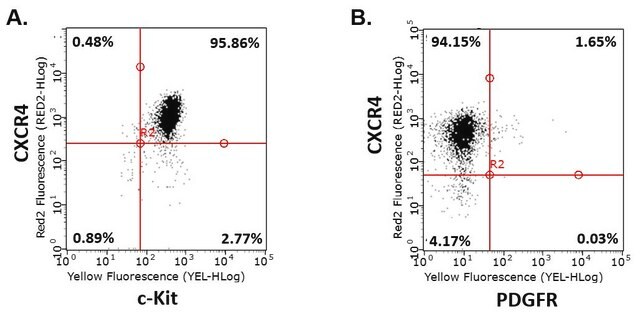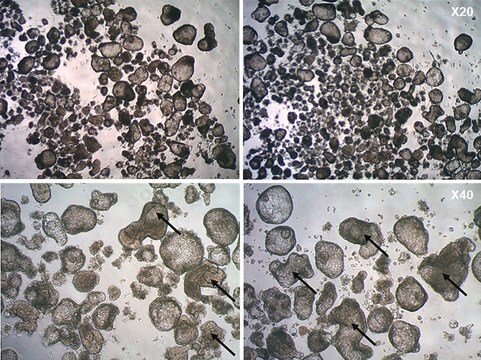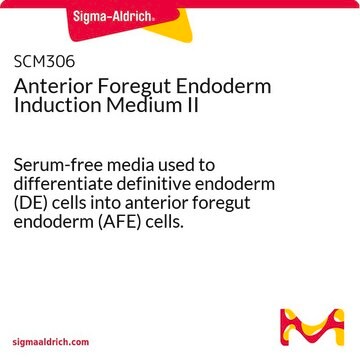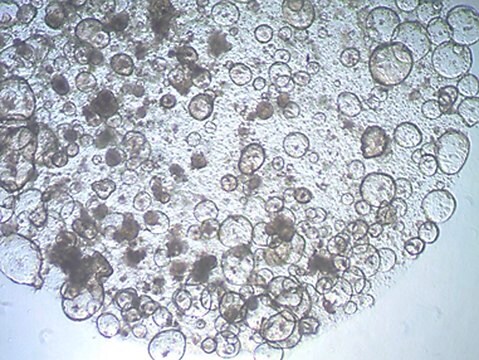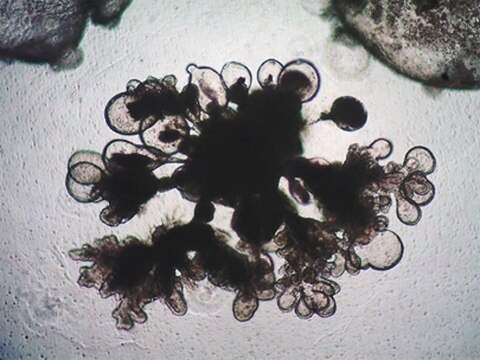SCM304
3dGRO® Human Colon Organoid Expansion Medium
Complete serum-free organoid media for the expansion and long-term 3D culture of human intestinal colon organoids.
Synonym(s):
Colon Organoid Culture Media, Intestinal Organoid Culture Media
About This Item
Recommended Products
form
liquid
packaging
pkg of 50 mL
technique(s)
cell culture | stem cell: suitable
osmolality
350-375 mOsm
application(s)
cell analysis
General description
Application
Research Category:
- Cell Culture
- Stem Cell Research
Quality
Osmolality: 350-375 mOsm
pH: 7.0 – 7.4
Sterility Tested: No Growth/Pass
Endotoxin: <2 EU/mL
Mycoplasma: Negative
Functional Assay: Thaw and culture of human colon organoids for 2 passages.
Storage and Stability
Legal Information
Disclaimer
Storage Class Code
12 - Non Combustible Liquids
WGK
WGK 1
Flash Point(F)
Not applicable
Flash Point(C)
Not applicable
Certificates of Analysis (COA)
Search for Certificates of Analysis (COA) by entering the products Lot/Batch Number. Lot and Batch Numbers can be found on a product’s label following the words ‘Lot’ or ‘Batch’.
Already Own This Product?
Find documentation for the products that you have recently purchased in the Document Library.
Articles
Human epithelial intestinal colonic organoids can be used as an alternative to Caco-2 drug permeability assays for drug screening and compound toxicity testing.
Organoid culture FAQs. Learn how to culture and analyze organoids following established 3D cell culture protocols. Tips and tricks.
Protocols
A rapid in vitro assay for CFTR function, the forskolin-induced swelling protocol uses human colon organoids, which can be derived from cystic fibrosis patient tissue.
Highly characterized cryopreserved human colonic organoids and a step-by-step organoid culture protocol for epithelial intestinal organoid differentiation from iPS cells.
Learn how to cultivate similar-sized iPSC-derived colon organoids using Millicell® Microwell plates and perform a forskolin-induced swelling assay.
Related Content
Monitor barrier formation using colon PDOs, iPSC-derived colon organoids, Millicell® cell culture inserts, and the Millicell® ERS. 3.0.
Explore our portfolio of 3D cell culture tools and technologies for any 3D cell line or application and discover organoids, hydrogels, ULA, microwell, or hydrogel plates, and more.
Our team of scientists has experience in all areas of research including Life Science, Material Science, Chemical Synthesis, Chromatography, Analytical and many others.
Contact Technical Service


